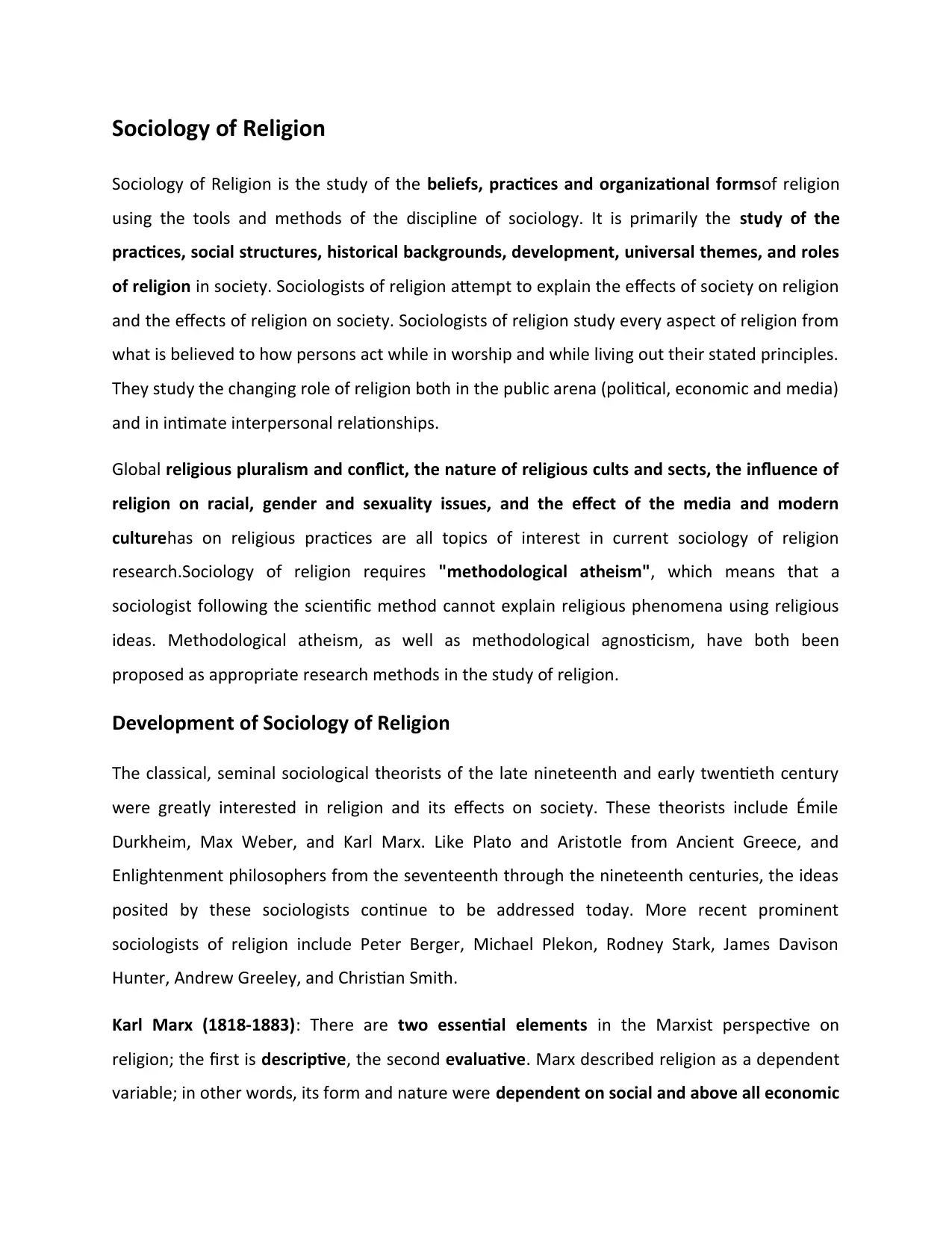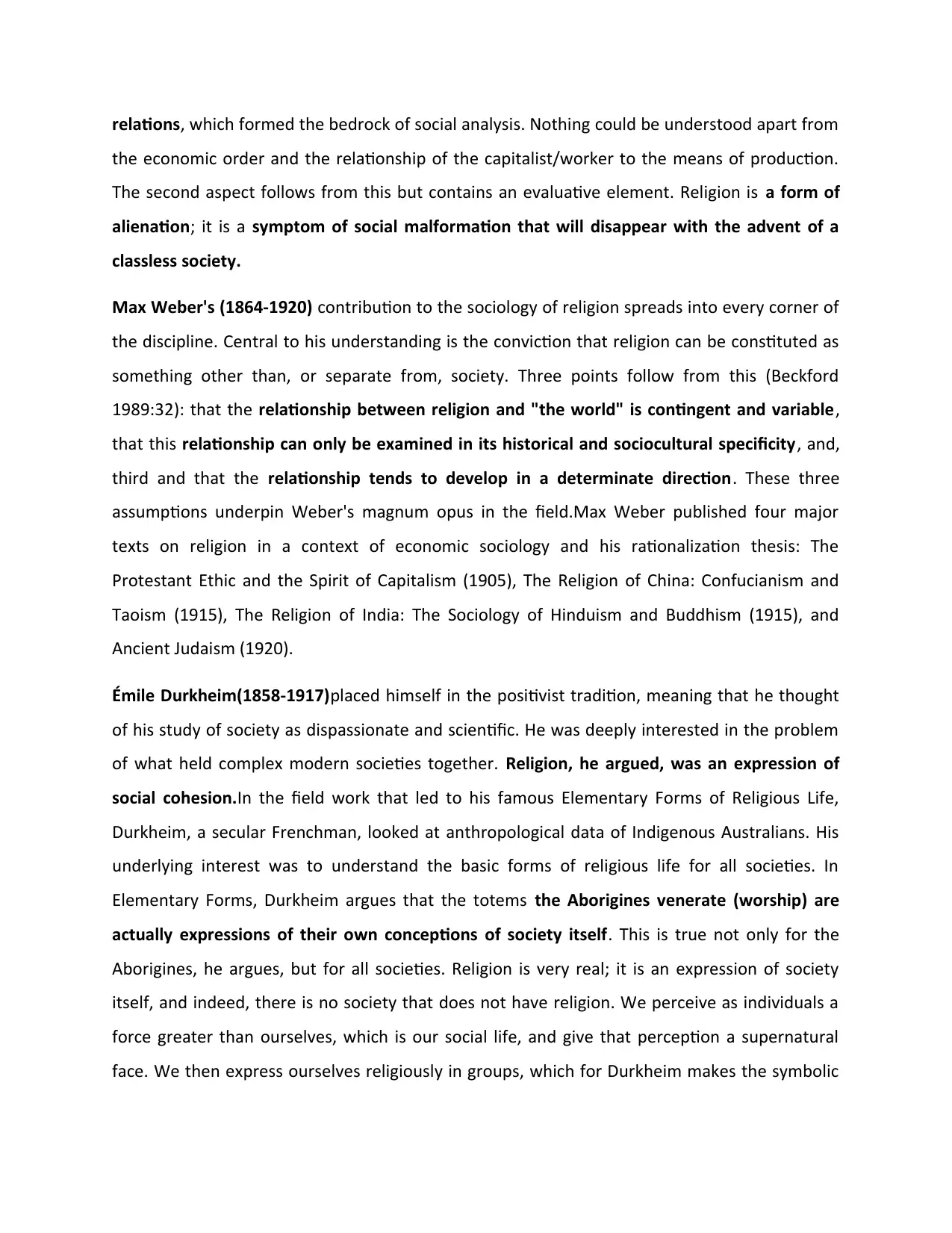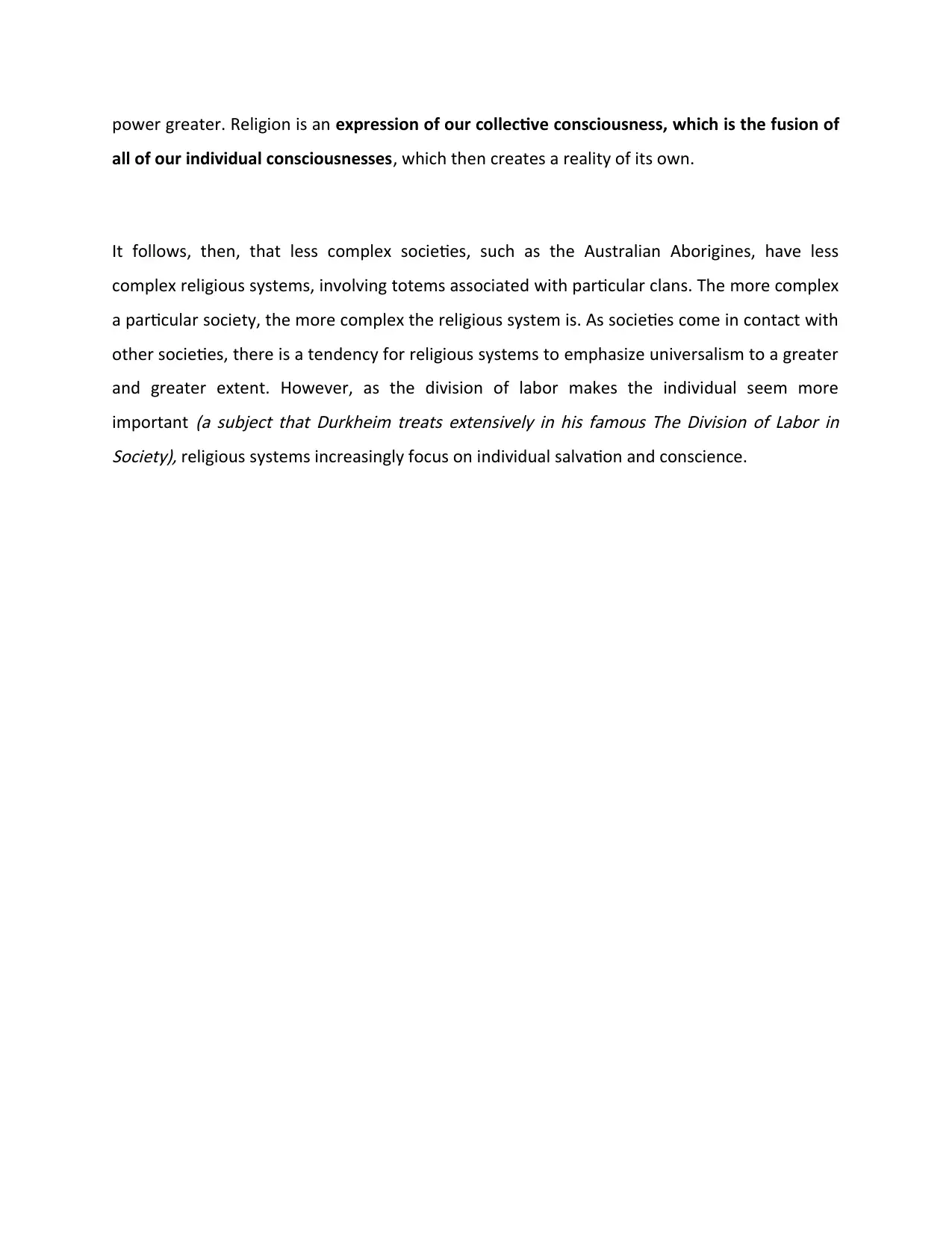Sociology of Religion: Durkheim, Marx, and Weber's Theories
VerifiedAdded on 2023/02/03
|3
|964
|79
Essay
AI Summary
This essay explores the field of sociology of religion, detailing its focus on religious beliefs, practices, and organizational forms using sociological methods. It examines the interplay between society and religion, studying the effects of each on the other. The essay covers various aspects, including global religious pluralism, the influence of media and culture, and the concept of methodological atheism. It also discusses the historical development of the field, highlighting the contributions of classical sociologists like Émile Durkheim, Max Weber, and Karl Marx. Marx viewed religion as a dependent variable shaped by economic relations and a form of alienation. Weber emphasized the contingent relationship between religion and society, examining it in its historical and sociocultural specificity. Durkheim, in his positivist approach, focused on religion as an expression of social cohesion, viewing religious practices as reflections of society itself.

Sociology of Religion
Sociology of Religion is the study of the beliefs, practices and organizational formsof religion
using the tools and methods of the discipline of sociology. It is primarily the study of the
practices, social structures, historical backgrounds, development, universal themes, and roles
of religion in society. Sociologists of religion attempt to explain the effects of society on religion
and the effects of religion on society. Sociologists of religion study every aspect of religion from
what is believed to how persons act while in worship and while living out their stated principles.
They study the changing role of religion both in the public arena (political, economic and media)
and in intimate interpersonal relationships.
Global religious pluralism and conflict, the nature of religious cults and sects, the influence of
religion on racial, gender and sexuality issues, and the effect of the media and modern
culturehas on religious practices are all topics of interest in current sociology of religion
research.Sociology of religion requires "methodological atheism", which means that a
sociologist following the scientific method cannot explain religious phenomena using religious
ideas. Methodological atheism, as well as methodological agnosticism, have both been
proposed as appropriate research methods in the study of religion.
Development of Sociology of Religion
The classical, seminal sociological theorists of the late nineteenth and early twentieth century
were greatly interested in religion and its effects on society. These theorists include Émile
Durkheim, Max Weber, and Karl Marx. Like Plato and Aristotle from Ancient Greece, and
Enlightenment philosophers from the seventeenth through the nineteenth centuries, the ideas
posited by these sociologists continue to be addressed today. More recent prominent
sociologists of religion include Peter Berger, Michael Plekon, Rodney Stark, James Davison
Hunter, Andrew Greeley, and Christian Smith.
Karl Marx (1818-1883): There are two essential elements in the Marxist perspective on
religion; the first is descriptive, the second evaluative. Marx described religion as a dependent
variable; in other words, its form and nature were dependent on social and above all economic
Sociology of Religion is the study of the beliefs, practices and organizational formsof religion
using the tools and methods of the discipline of sociology. It is primarily the study of the
practices, social structures, historical backgrounds, development, universal themes, and roles
of religion in society. Sociologists of religion attempt to explain the effects of society on religion
and the effects of religion on society. Sociologists of religion study every aspect of religion from
what is believed to how persons act while in worship and while living out their stated principles.
They study the changing role of religion both in the public arena (political, economic and media)
and in intimate interpersonal relationships.
Global religious pluralism and conflict, the nature of religious cults and sects, the influence of
religion on racial, gender and sexuality issues, and the effect of the media and modern
culturehas on religious practices are all topics of interest in current sociology of religion
research.Sociology of religion requires "methodological atheism", which means that a
sociologist following the scientific method cannot explain religious phenomena using religious
ideas. Methodological atheism, as well as methodological agnosticism, have both been
proposed as appropriate research methods in the study of religion.
Development of Sociology of Religion
The classical, seminal sociological theorists of the late nineteenth and early twentieth century
were greatly interested in religion and its effects on society. These theorists include Émile
Durkheim, Max Weber, and Karl Marx. Like Plato and Aristotle from Ancient Greece, and
Enlightenment philosophers from the seventeenth through the nineteenth centuries, the ideas
posited by these sociologists continue to be addressed today. More recent prominent
sociologists of religion include Peter Berger, Michael Plekon, Rodney Stark, James Davison
Hunter, Andrew Greeley, and Christian Smith.
Karl Marx (1818-1883): There are two essential elements in the Marxist perspective on
religion; the first is descriptive, the second evaluative. Marx described religion as a dependent
variable; in other words, its form and nature were dependent on social and above all economic
Paraphrase This Document
Need a fresh take? Get an instant paraphrase of this document with our AI Paraphraser

relations, which formed the bedrock of social analysis. Nothing could be understood apart from
the economic order and the relationship of the capitalist/worker to the means of production.
The second aspect follows from this but contains an evaluative element. Religion is a form of
alienation; it is a symptom of social malformation that will disappear with the advent of a
classless society.
Max Weber's (1864-1920) contribution to the sociology of religion spreads into every corner of
the discipline. Central to his understanding is the conviction that religion can be constituted as
something other than, or separate from, society. Three points follow from this (Beckford
1989:32): that the relationship between religion and "the world" is contingent and variable,
that this relationship can only be examined in its historical and sociocultural specificity, and,
third and that the relationship tends to develop in a determinate direction. These three
assumptions underpin Weber's magnum opus in the field.Max Weber published four major
texts on religion in a context of economic sociology and his rationalization thesis: The
Protestant Ethic and the Spirit of Capitalism (1905), The Religion of China: Confucianism and
Taoism (1915), The Religion of India: The Sociology of Hinduism and Buddhism (1915), and
Ancient Judaism (1920).
Émile Durkheim(1858-1917)placed himself in the positivist tradition, meaning that he thought
of his study of society as dispassionate and scientific. He was deeply interested in the problem
of what held complex modern societies together. Religion, he argued, was an expression of
social cohesion.In the field work that led to his famous Elementary Forms of Religious Life,
Durkheim, a secular Frenchman, looked at anthropological data of Indigenous Australians. His
underlying interest was to understand the basic forms of religious life for all societies. In
Elementary Forms, Durkheim argues that the totems the Aborigines venerate (worship) are
actually expressions of their own conceptions of society itself. This is true not only for the
Aborigines, he argues, but for all societies. Religion is very real; it is an expression of society
itself, and indeed, there is no society that does not have religion. We perceive as individuals a
force greater than ourselves, which is our social life, and give that perception a supernatural
face. We then express ourselves religiously in groups, which for Durkheim makes the symbolic
the economic order and the relationship of the capitalist/worker to the means of production.
The second aspect follows from this but contains an evaluative element. Religion is a form of
alienation; it is a symptom of social malformation that will disappear with the advent of a
classless society.
Max Weber's (1864-1920) contribution to the sociology of religion spreads into every corner of
the discipline. Central to his understanding is the conviction that religion can be constituted as
something other than, or separate from, society. Three points follow from this (Beckford
1989:32): that the relationship between religion and "the world" is contingent and variable,
that this relationship can only be examined in its historical and sociocultural specificity, and,
third and that the relationship tends to develop in a determinate direction. These three
assumptions underpin Weber's magnum opus in the field.Max Weber published four major
texts on religion in a context of economic sociology and his rationalization thesis: The
Protestant Ethic and the Spirit of Capitalism (1905), The Religion of China: Confucianism and
Taoism (1915), The Religion of India: The Sociology of Hinduism and Buddhism (1915), and
Ancient Judaism (1920).
Émile Durkheim(1858-1917)placed himself in the positivist tradition, meaning that he thought
of his study of society as dispassionate and scientific. He was deeply interested in the problem
of what held complex modern societies together. Religion, he argued, was an expression of
social cohesion.In the field work that led to his famous Elementary Forms of Religious Life,
Durkheim, a secular Frenchman, looked at anthropological data of Indigenous Australians. His
underlying interest was to understand the basic forms of religious life for all societies. In
Elementary Forms, Durkheim argues that the totems the Aborigines venerate (worship) are
actually expressions of their own conceptions of society itself. This is true not only for the
Aborigines, he argues, but for all societies. Religion is very real; it is an expression of society
itself, and indeed, there is no society that does not have religion. We perceive as individuals a
force greater than ourselves, which is our social life, and give that perception a supernatural
face. We then express ourselves religiously in groups, which for Durkheim makes the symbolic

power greater. Religion is an expression of our collective consciousness, which is the fusion of
all of our individual consciousnesses, which then creates a reality of its own.
It follows, then, that less complex societies, such as the Australian Aborigines, have less
complex religious systems, involving totems associated with particular clans. The more complex
a particular society, the more complex the religious system is. As societies come in contact with
other societies, there is a tendency for religious systems to emphasize universalism to a greater
and greater extent. However, as the division of labor makes the individual seem more
important
(a subject that Durkheim treats extensively in his famous The Division of Labor in
Society), religious systems increasingly focus on individual salvation and conscience.
all of our individual consciousnesses, which then creates a reality of its own.
It follows, then, that less complex societies, such as the Australian Aborigines, have less
complex religious systems, involving totems associated with particular clans. The more complex
a particular society, the more complex the religious system is. As societies come in contact with
other societies, there is a tendency for religious systems to emphasize universalism to a greater
and greater extent. However, as the division of labor makes the individual seem more
important
(a subject that Durkheim treats extensively in his famous The Division of Labor in
Society), religious systems increasingly focus on individual salvation and conscience.
⊘ This is a preview!⊘
Do you want full access?
Subscribe today to unlock all pages.

Trusted by 1+ million students worldwide
1 out of 3
Related Documents
Your All-in-One AI-Powered Toolkit for Academic Success.
+13062052269
info@desklib.com
Available 24*7 on WhatsApp / Email
![[object Object]](/_next/static/media/star-bottom.7253800d.svg)
Unlock your academic potential
Copyright © 2020–2026 A2Z Services. All Rights Reserved. Developed and managed by ZUCOL.



